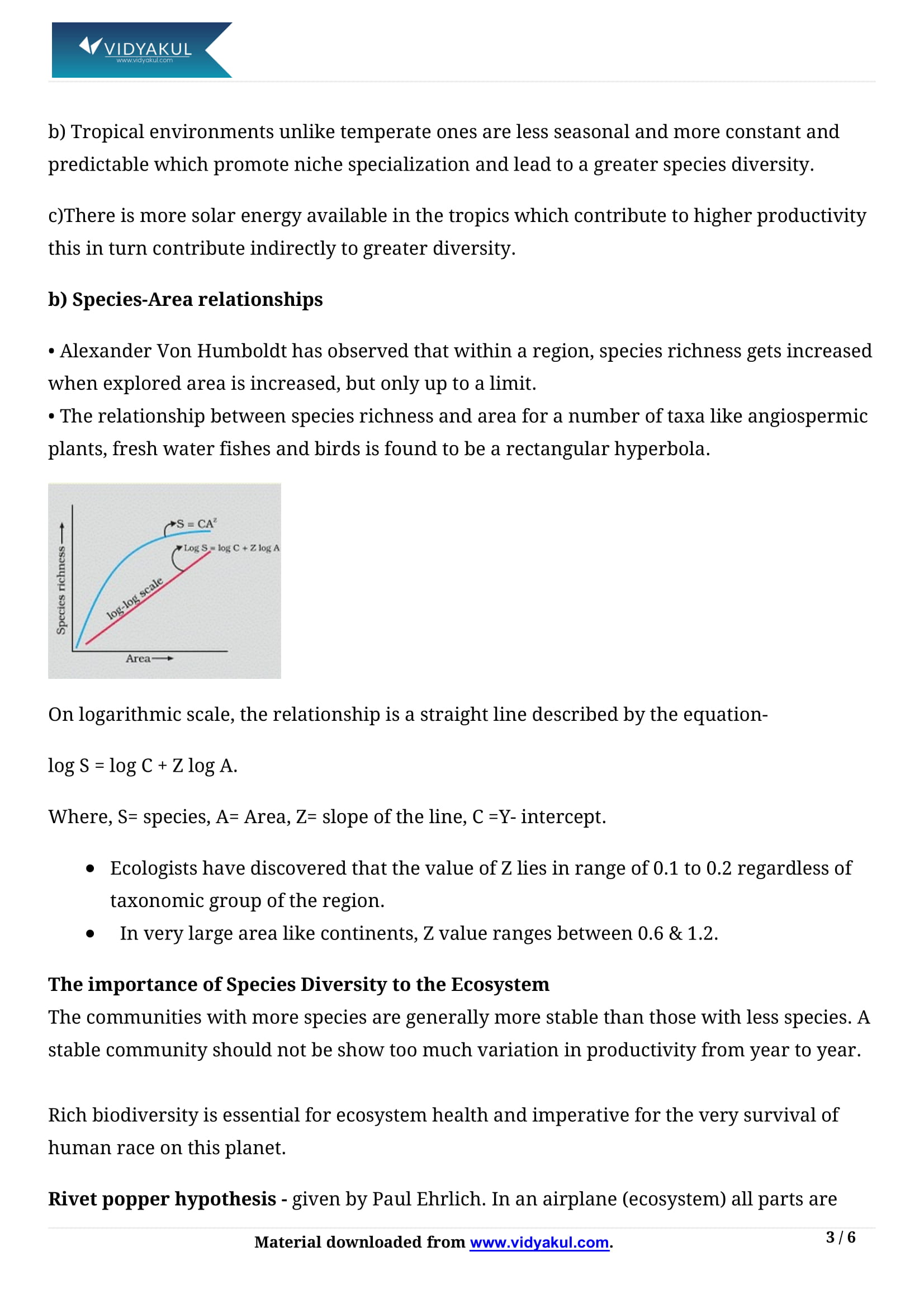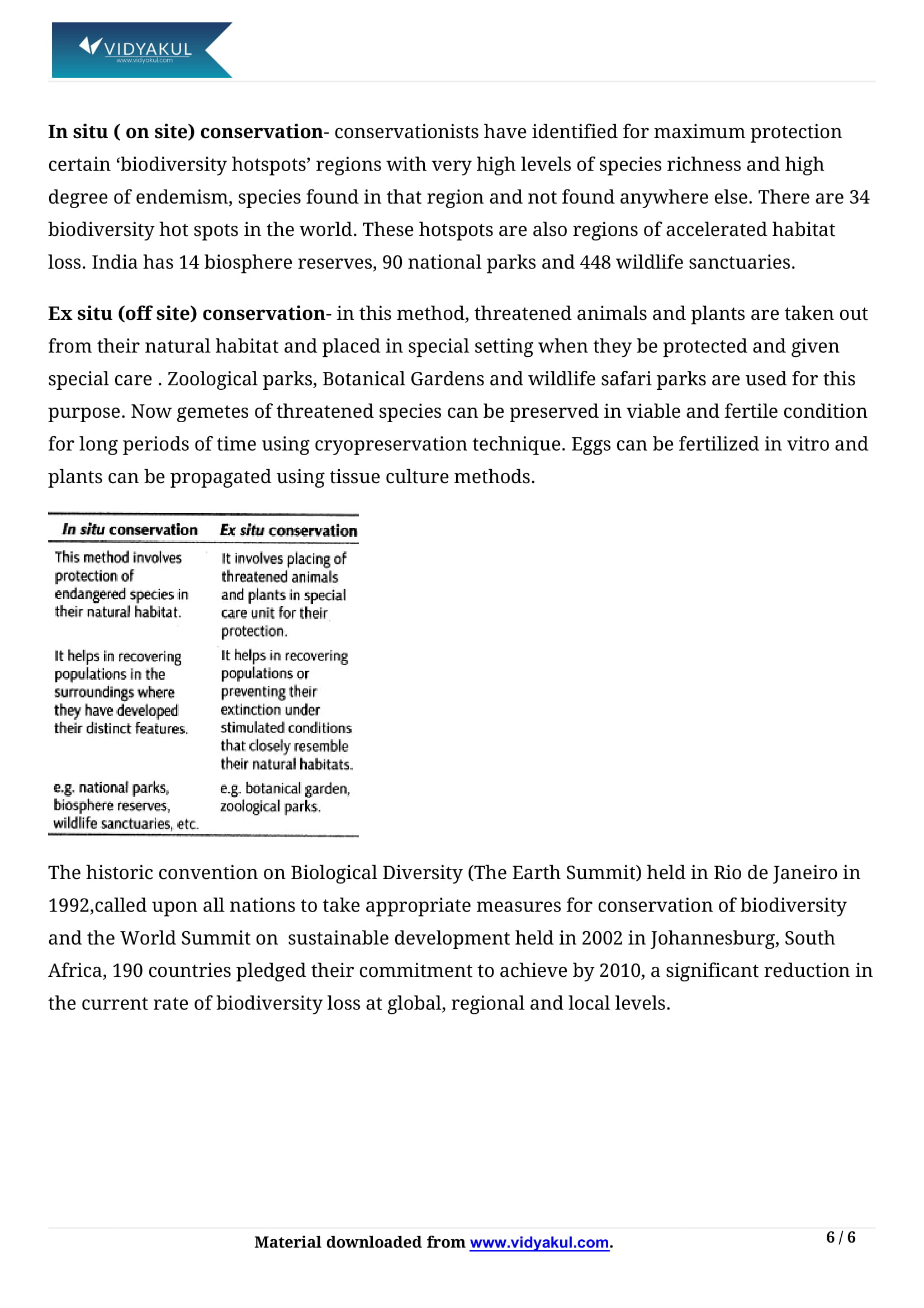Biodiversity and Conservation Class 12 Notes

Chapter 15 Biodiversity and Conservation
Biology in Class 12 is an important subject for students. Students who wish to appear in competitive exams should refer to the NCERT notes for Class 12 Biology Chapter 15. Designed as per the latest guidelines, these NCERT notes can be quite helpful for the students to appear for board exams.CBSE Class 12 Biology Chapter 15 focuses on Biodiversity and Conservation.
It further deals with various subtopics such as biodiversity and conservation of biodiversity. Vidyakul provides practice questions for both subtopics. Students must refer to each of these questions while preparing for the board and competitive exams. This great opportunity for them. Moreover, these practice questions are available for free at Vidyakul. Students can sign up for the platform and start practicing these for better learning. Scroll down to find more details here.
CBSE CLASS 12th BIOLOGY CH-15
Points to Remember
Biodiversity refers to the number and variety of species, in an ecosystem and of genetic variation contained within a species. It can also be defined as the totality of genes, species and ecosystems of a region.
A rough estimate by many scientists may turn out to be 77 million or more as many species are still undiscovered.
There is greater biodiversity in tropical/subtropical regions than in temperate and polar regions.
Although all the biodiversity hotspots put together cover less than two per cent of Earth’s land area, the number of species they collectively harbour is extremely high.
Earth’s fossil history reveals the incidence of mass extinctions in the past, but the present rates of extinction, largely attributed to human activities, are 100 to 1000 times higher.
Topics and Sub-topics
Students are expected to follow all exercises in the Biodiversity and Biodiversity Conservation available on Vidyakul because it is entirely theory-based, students can answer practical questions and prepare for exams.
Additionally, students can follow the questions and text chapters provided in Vidyakul. So completing the questions in each subtopic will help students get the most out of it. Students should also pay attention to the text questions provided on Vidyakul.
Biodiversity refers to the number and variety of species, in an ecosystem and of genetic variation contained within a species. It can also be defined as the totality of genes, species and ecosystems of a region.
A rough estimate by many scientists may turn out to be 77 million or more as many species are still undiscovered.
There is greater biodiversity in tropical/subtropical regions than in temperate and polar regions.
Although all the biodiversity hotspots put together cover less than two per cent of Earth’s land area, the number of species they collectively harbour is extremely high.
Earth’s fossil history reveals the incidence of mass extinctions in the past, but the present rates of extinction, largely attributed to human activities, are 100 to 1000 times higher.
Learn more about it in Biodiversity and Conservation Class 12 Notes pdf.
Download this solution for FREE Download this PDF
Download Vidyakul App for more Important videos, PDF's and Free video lectures.





cbse-class-12-Biology-Notes-chapter-15-Biodiversity-and-Conservation
Frequently Asked Questions
What is ‘Global Warming’?
Global warming is the unusually rapid increase in Earth’s average surface temperature over the past century primarily due to the greenhouse gases released as people burn fossil fuels.
What is the meaning of ‘Extinction’?
Extinction refers to the dying out or extermination of a species.
What is ‘Evolution’?
Evolution is the change in the characteristics of a species over several generations and relies on the process of natural selection.
What is ‘Global Warming’?
What is the meaning of ‘Extinction’?
What is ‘Evolution’?
Practice Questions
Humans derive a number of economic benefits from nature such as firewood, food, construction material, fibre, and medicines.
The Amazon forests provide 20% of the total atmospheric oxygen on earth.
These are our biological legacies and should be passed on to future generations.
The birds, bees and birds are some of the pollinating agents in the ecosystem.
Humans derive a number of economic benefits from nature such as firewood, food, construction material, fibre, and medicines.
The Amazon forests provide 20% of the total atmospheric oxygen on earth.
These are our biological legacies and should be passed on to future generations.
The birds, bees and birds are some of the pollinating agents in the ecosystem.



